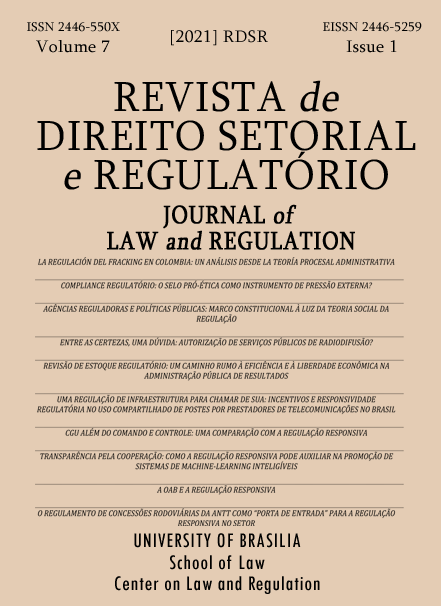Regulatory Compliance
Is the Pró-Ética accreditation an external pressure instrument?
Palabras clave:
Compliance. Pró-Ética. CGU. External Pressure. Responsibility.Resumen
[Purpose] To analyze the potential fulfilment of the Pró-Ética seal, granted by the Comptroller-General Office, in the theory of external pressures which are able to promote the compliance by companies, including the empirical analysis of public information on Pró-Ética.
[Methodology/approach/design] It is based on the external pressure theory of compliance, mainly developed by Professors Cary Coglianese, Jennifer Howard-Grenville and Jennifer Nash (2008), that is, on elements that are external to the company and are able to promote the adoption of the corporate social responsibility.
[Findings] The Pró-Ética seal can be considered an external pressure of compliance. Nevertheless, considering the empirical information and the specificities of the seal, it does not necessarily promote immediately the adoption of compliance programs by companies.
Descargas
Citas
CASTRO, Rodrigo Pironti Aguirre de; PAULA, Marco Aurélio Borges de. Compliance, gestão de riscos e combate à corrupção: integridade para o desenvolvimento. Belo Horizonte: Fórum, 2018.
COGLIANESE, Cary; LAZER, David. Management-Based Regulation: Prescribing Private Management to Achieve Public Goals. Law & Society Review 37(4): 691-730, 2003.
DARMAWAN, A., NISA, A., & REJEKI, S. (2018). The Effect of Management Ownership, Institutional Ownership, Corporate Social Responsibility and Proftability to the Company’s Value. International Journal Of Islamic Business And Economics (IJIBEC), 107 - 117.
HOWARD-GRENVILLE, Jennifer; NASH, Jennifer; COGLIANESE, Cary. Constructing the License to Operate: Internal Factors and their Influence on Corporate Environmental Decisions. Law & Policy 30(1): 73-107, 2008.
LOBO FILHO, Fernando Rissoli. A lei anticorrupção e o direito administrativo sancionador. São Paulo: IASP, 2017.
OLIVEIRA, Luis Gustavo Mirande de. Compliance e integridade: aspectos práticos e teóricos. Belo Horizonte: D’Plácido, 2017.
PORTO, Vinicius; MARQUES, Jader. O compliance como instrumento de prevenção e combate à corrupção. Porto Alegre, Livraria do Advogado, 2017.
RIBEIRO, Márcio de Aguiar. Responsabilidade administrativa de pessoas jurídicas à luz da lei anticorrupção empresarial. Belo Horizonte: Fórum, 2017.
RUBINSTEIN, Marianne. Le développment de la responsabilité sociale de l’entreprise: Une analyse en termes d’isomorphisme institutionnel. Revue d’économie industrielle, 113, 2006, p. 83-105.
THORNTON, Dorothy, KAGAN, Robert A., & GUNNINGHAM, Neil. (2009). When Social Norms and Pressures Are Not Enough: Environmental Performance in the Trucking Industry. Law & Society Review 43(2): 405-435.
UNIÃO EUROPEIA. COM/2001/0366. Livro Verde. 2001. Disponível em: https://eur- lex.europa.eu/legal- content/PT/TXT/HTML/?uri=CELEX:52001DC0366&from=EN.
VERÍSSIMO, Carla. Compliance: incentivo à adoção de medidas anticorrupção. São Paulo: Saraiva, 2017.
VOGEL, David. The Market for Virtue: The Potential and Limits of Corporate Social Responsibility. Washington, D.C.: Bookings Institution Press, 2005.
Descargas
Publicado
Cómo citar
Número
Sección
Licencia
Derechos de autor 2021 Revista de Direito Setorial e Regulatório

Esta obra está bajo una licencia internacional Creative Commons Atribución 4.0.
Al enviar este documento a la Revista de Derecho, Estado y Telecomunicaciones, declaro que estoy aceptando los términos de Creative Commons Attribution 4.0 International (CC BY 4.0), disponible en http://creativecommons.org/licenses/by/4.0.


